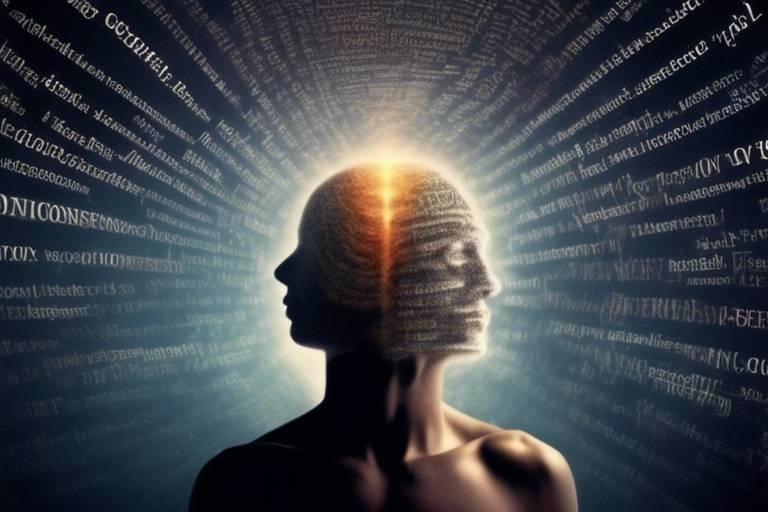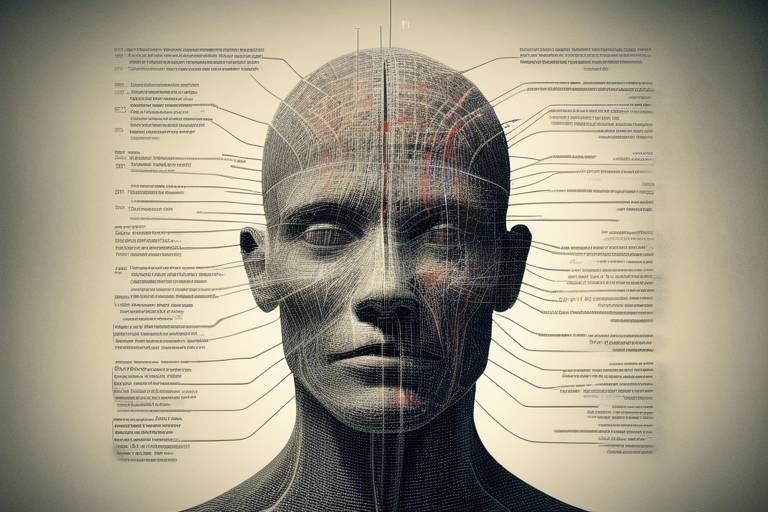Consciousness - A Universal Phenomenon?
Have you ever stopped to wonder what consciousness really is? It's a question that has puzzled philosophers, scientists, and everyday people alike for centuries. Consciousness can be described as the state of being aware of and able to think and perceive one's surroundings, but that's just the tip of the iceberg. It’s a complex phenomenon that encompasses everything from our thoughts and emotions to our sense of self and our interactions with the world. In this article, we will embark on a fascinating journey to explore the nature of consciousness, its definitions, and its implications across various fields, including philosophy, neuroscience, and psychology.
As we dive deeper, we'll discover that consciousness is not just a single entity but rather a tapestry woven from various threads of understanding. Different disciplines offer unique perspectives on this universal phenomenon, each contributing to a more comprehensive understanding of what it means to be conscious. From the intricate workings of the brain to the philosophical debates that have shaped human thought, consciousness is a subject that invites curiosity and exploration.
One of the most intriguing aspects of consciousness is its universality. Despite the vast cultural and scientific differences across the globe, the experience of being conscious is something that connects us all. Whether it's the fleeting thoughts that cross our minds or the profound moments of self-awareness, consciousness is an intrinsic part of the human experience. But what does it mean for something to be universal? In this context, it suggests that while our individual experiences may vary, the fundamental essence of consciousness is a shared aspect of existence.
As we navigate through this article, we will examine various definitions and theories of consciousness, shedding light on how it is understood in different contexts. We will also explore the implications of consciousness in our daily lives and its significance in the grand scheme of things. So, buckle up and get ready for a mind-expanding exploration of consciousness, a phenomenon that is as mysterious as it is universal.
- What is consciousness? - Consciousness refers to the state of being aware of and able to think about one's own existence, thoughts, and surroundings.
- Why is consciousness important? - Understanding consciousness is crucial because it relates to our sense of self, decision-making, and how we interact with the world.
- Are there different types of consciousness? - Yes, consciousness can be categorized into various types, including self-awareness, social consciousness, and collective consciousness.
- How do scientists study consciousness? - Scientists use a range of methods, including neuroimaging, psychological experiments, and philosophical inquiry, to study consciousness.

The Definition of Consciousness
Understanding consciousness begins with grappling with its definition, which is anything but straightforward. At its core, consciousness refers to our awareness of ourselves and our environment. It’s that inner voice that narrates our experiences, the feelings that arise when we encounter joy or sorrow, and the thoughts that race through our minds. However, when we dive deeper, we find that consciousness is a multifaceted phenomenon that eludes a single, universal definition.
Different disciplines approach consciousness from unique angles. For instance, in philosophy, consciousness is often seen as the essence of what it means to be human. Philosophers like René Descartes famously posited, "I think, therefore I am," highlighting the intrinsic link between thought and existence. In contrast, neuroscience seeks to unravel consciousness through the lens of brain activity, exploring how neural processes give rise to our subjective experiences. Meanwhile, psychology examines consciousness in terms of behavior and mental processes, asking how awareness influences our actions.
Despite these varied interpretations, there are common threads that weave through the understanding of consciousness. One of the most notable challenges is the subjectivity of conscious experience. Each individual's perception of consciousness is shaped by personal experiences, cultural background, and even biological factors. This leads us to ponder: can we ever truly understand another person's consciousness? Or is it a solitary experience, locked away in the confines of our minds?
To illustrate the complexity of consciousness, consider the following table that summarizes different perspectives:
| Discipline | Perspective on Consciousness |
|---|---|
| Philosophy | Essence of being; linked to self-awareness and existence. |
| Neuroscience | Focus on brain activity and neural correlates of experience. |
| Psychology | Study of behavior and mental processes influenced by awareness. |
In addition to these academic perspectives, cultural interpretations of consciousness also play a pivotal role in shaping our understanding. For example, many Eastern philosophies view consciousness as interconnected with the universe, emphasizing a sense of oneness with all beings. In contrast, Western thought often emphasizes individualism and the separation of the self from the external world. These differing viewpoints enrich the dialogue on consciousness, illustrating that it is not merely a scientific or philosophical issue, but a deeply human one.
Ultimately, the quest to define consciousness reveals more questions than answers. It challenges us to explore the very nature of reality, existence, and our place within the cosmos. As we continue to probe this profound topic, we must remain open to the myriad interpretations and experiences that contribute to our understanding of what it means to be conscious. So, what do you think? Is consciousness a universal phenomenon, or is it as unique as each individual who experiences it?

Theories of Consciousness
When it comes to understanding consciousness, we find ourselves diving into a sea of theories that attempt to unravel this complex phenomenon. Each theory presents a unique lens through which we can examine the essence of what it means to be conscious. From ancient philosophies to cutting-edge neuroscientific research, the landscape of consciousness studies is rich and diverse. But why is it so difficult to pin down a single definition? The answer lies in the multifaceted nature of consciousness itself, which encompasses a wide range of experiences, perceptions, and interpretations.
One of the most prominent debates in the realm of consciousness is between dualism and materialism. Dualism posits that the mind and body are separate entities, while materialism argues that consciousness arises solely from physical processes within the brain. This dichotomy has been at the center of philosophical discussions for centuries, with each side presenting compelling arguments. For instance, dualists often cite the qualitative aspects of experience—how it feels to taste chocolate or hear a symphony—as evidence that consciousness cannot be fully explained by physical processes alone.
On the other hand, materialists point to advancements in neuroscience that demonstrate a direct correlation between brain activity and conscious experience. They argue that as we continue to map the brain and understand its functions, we will inevitably uncover the mechanisms that give rise to consciousness. This leads us into the fascinating realm of emergent properties, where some theorists propose that consciousness is not a fundamental aspect of reality but rather an emergent phenomenon arising from complex systems. In this view, just as water emerges from the interaction of hydrogen and oxygen, consciousness may emerge from the intricate networking of neurons.
To illustrate the breadth of theories surrounding consciousness, let's take a look at some of the major perspectives:
| Theory | Description | Proponents |
|---|---|---|
| Dualism | Mind and body are separate; consciousness exists independently of the physical brain. | René Descartes, Plato |
| Materialism | Consciousness arises solely from physical processes in the brain. | Daniel Dennett, Patricia Churchland |
| Functionalism | Consciousness is defined by its functional role rather than its physical substrate. | Hilary Putnam, Jerry Fodor |
| Panpsychism | Consciousness is a fundamental feature of all matter. | Galen Strawson, Philip Goff |
As we navigate through these theories, it becomes clear that each brings something valuable to the table. The challenge lies in integrating these perspectives to form a more comprehensive understanding of consciousness. The debates are not just academic; they have profound implications for how we view ourselves and our place in the universe. Are we merely biological machines, or is there something more profound at play? These questions linger in the air, inviting us to explore further.
In conclusion, the theories of consciousness are as varied as the experiences of consciousness itself. They challenge us to think critically about our existence and to question the very nature of reality. As we continue to delve into this captivating subject, we may find ourselves not just seeking answers, but also embracing the mystery of consciousness as a universal phenomenon that connects us all.
- What is consciousness? Consciousness refers to the state of being aware of and able to think about one's own existence, thoughts, and surroundings.
- Why is understanding consciousness important? Understanding consciousness can help us comprehend the nature of reality, the mind-body relationship, and our own experiences.
- What are the main theories of consciousness? Major theories include dualism, materialism, functionalism, and panpsychism, each offering distinct perspectives.
- Can consciousness be measured? While measuring consciousness is challenging, neuroscientific techniques like fMRI and EEG are used to study brain activity related to conscious experiences.

Dualism vs. Materialism
When we dive into the fascinating world of consciousness, we often find ourselves at a crossroads between two dominant philosophical perspectives: dualism and materialism. These two viewpoints offer contrasting explanations for the nature of consciousness, and understanding their differences can illuminate our own beliefs about the mind-body relationship. So, what exactly do these terms mean? Let’s break it down.
At its core, dualism posits that the mind and body are fundamentally different entities. This perspective was famously championed by René Descartes, who argued that while our bodies are physical and governed by the laws of nature, our minds are non-physical and exist in a separate realm. Imagine a computer and the software it runs on: the hardware (the computer) is tangible and can be touched, while the software (the programs) is intangible and exists in a different dimension. This analogy captures the essence of dualism, suggesting that our mental experiences cannot be entirely explained by physical processes alone.
On the other hand, materialism takes a more straightforward approach, asserting that everything, including consciousness, arises from physical substances and processes. In this view, our thoughts, feelings, and experiences are the byproducts of neural activities in the brain. Think of it as a symphony: the orchestra (the brain's neurons and their connections) produces music (consciousness) through the interaction of its instruments. Materialists argue that as we advance in neuroscience, we uncover more about how brain activity correlates with our conscious experiences, suggesting that consciousness is, in fact, a product of physical processes.
The debate between these two perspectives is not just academic; it has profound implications for how we understand our own existence. For instance, dualism raises questions about the afterlife and the possibility of a soul, while materialism challenges us to reconsider concepts like free will and personal identity. Can we truly be held accountable for our actions if they are merely the result of chemical reactions in our brains? This philosophical tug-of-war continues to captivate thinkers across disciplines.
To further illustrate the differences between dualism and materialism, here’s a quick comparison:
| Aspect | Dualism | Materialism |
|---|---|---|
| Nature of Mind | Non-physical entity | Physical process |
| Mind-Body Relationship | Separate but interacting | Mind is a product of the body |
| Implications for Afterlife | Possible existence of a soul | No afterlife; consciousness ceases |
| Scientific Support | Less support from modern science | Strong support from neuroscience |
In conclusion, the dualism vs. materialism debate is more than just a philosophical exercise; it shapes our understanding of what it means to be conscious. Whether you lean towards the metaphysical implications of dualism or the empirical foundations of materialism, engaging with these ideas can enrich your perspective on the profound mystery of consciousness.
- What is dualism? Dualism is the belief that the mind and body are separate entities, with the mind being non-physical.
- What is materialism? Materialism asserts that everything, including consciousness, is a product of physical processes in the brain.
- Who were the key proponents of dualism? René Descartes is one of the most notable figures associated with dualism.
- How does neuroscience relate to materialism? Advancements in neuroscience provide evidence that consciousness arises from brain activity, supporting materialist views.

Historical Context of Dualism
To truly grasp the concept of dualism, we must journey back in time to its philosophical roots, where it emerged as a powerful framework for understanding the human experience. Dualism, in essence, posits that the mind and body are two distinct entities that interact yet remain fundamentally separate. This idea was famously championed by the French philosopher René Descartes in the 17th century. Descartes argued that the mind, or soul, is a non-physical substance, while the body is a physical entity governed by the laws of nature. This separation laid the groundwork for centuries of debate and inquiry into the nature of consciousness.
In the historical context, dualism can be traced back to ancient philosophies, with significant contributions from thinkers in various traditions. For instance, in Greek philosophy, Plato suggested a similar dichotomy, proposing that the soul exists independently of the body and continues to exist after physical death. This idea resonated through the ages, influencing religious doctrines and philosophical discourses. In many religious traditions, the notion of a soul or spirit distinct from the body has been a cornerstone, reinforcing dualist perspectives.
Moreover, dualism found its way into the realm of science, particularly during the Enlightenment, when the rise of empirical thought began to challenge traditional views. Descartes' famous dictum, "Cogito, ergo sum" ("I think, therefore I am"), encapsulates the dualist perspective by emphasizing the primacy of thought and consciousness as evidence of existence. This assertion sparked numerous debates among philosophers and scientists alike, leading to questions about how these two realms—the mental and the physical—interact.
Fast forward to the 19th and 20th centuries, and we see dualism facing significant challenges from emerging scientific paradigms. The advent of psychology and neuroscience began to shift the focus towards a more integrated understanding of the mind-body relationship. Despite this, dualism remains a compelling viewpoint, as it resonates with many people's lived experiences, particularly in how we perceive emotions, thoughts, and sensations.
In summary, the historical context of dualism is rich and complex, woven into the fabric of philosophical thought across centuries. It has evolved through the contributions of various thinkers, each adding layers of meaning to the discourse. While modern science has increasingly leaned towards materialist explanations, the dualist perspective continues to provoke discussion, inviting us to ponder the intricate connection between our minds and bodies.
- What is dualism? Dualism is the philosophical view that the mind and body are two distinct entities that interact but are fundamentally different in nature.
- Who is a key figure in the development of dualism? René Descartes is often credited with formalizing dualist thought in the 17th century.
- How does dualism relate to consciousness? Dualism posits that consciousness arises from a non-physical mind that exists separately from the physical body.
- Is dualism still relevant today? Yes, dualism continues to be a significant philosophical perspective, engaging discussions in philosophy, psychology, and neuroscience.

Materialism in Modern Science
Materialism has become a cornerstone of modern scientific inquiry, fundamentally shaping our understanding of consciousness. At its core, materialism posits that everything that exists is either made of matter or is dependent on matter for its existence. This perspective has profound implications for how we study consciousness, suggesting that our thoughts, feelings, and experiences can ultimately be traced back to physical processes within the brain. As neuroscientific techniques advance, we are increasingly able to map brain activity to specific mental states, providing compelling evidence for the materialist view.
For instance, studies utilizing functional magnetic resonance imaging (fMRI) have shown that certain patterns of neural activity correspond to specific thoughts or emotions. This correlation raises fascinating questions: If consciousness can be linked so closely to physical brain activity, what does that mean for our understanding of free will and identity? Are we merely the sum of our neural connections? These inquiries challenge the notion of a dualistic separation between mind and body, pushing us to reconsider long-held beliefs about the nature of our existence.
Moreover, the advancements in neurobiology have led to the development of various theories that attempt to explain consciousness through a materialist lens. One such theory is the Integrated Information Theory (IIT), which suggests that consciousness arises from the way information is processed within the brain. According to IIT, the more integrated and interconnected the information, the higher the level of consciousness. This theory is not only groundbreaking but also aligns with the materialist perspective, as it emphasizes the physical interactions of neurons as the basis for conscious experience.
In addition to IIT, the rise of computational neuroscience has further reinforced materialist views by simulating brain functions and exploring how these simulations can replicate aspects of consciousness. As we create more sophisticated models of brain activity, the line between biological processes and artificial intelligence blurs, leading to intriguing discussions about the potential for machines to possess consciousness. This possibility raises ethical questions about the rights of sentient machines and the very definition of consciousness itself.
In summary, materialism in modern science is not just a theoretical stance; it is a dynamic framework that drives research and shapes our understanding of consciousness. As we continue to explore the depths of the human mind, the materialist perspective provides a solid foundation for unraveling the mysteries of our existence. By examining the intricate relationships between brain activity and conscious experience, we are on the brink of potentially redefining what it means to be conscious in a rapidly evolving scientific landscape.
- What is materialism in the context of consciousness?
Materialism is the philosophical view that everything, including consciousness, can be explained in terms of physical processes and matter. - How does neuroscience support materialist views of consciousness?
Neuroscience provides evidence by mapping brain activity to mental states, suggesting that consciousness arises from neural interactions. - What is Integrated Information Theory (IIT)?
IIT is a theory that proposes consciousness is linked to the integration of information within the brain. - Can machines possess consciousness?
This is a debated topic; advancements in AI and computational neuroscience raise questions about the nature of consciousness and whether it can be replicated artificially.

Emergent Properties of Consciousness
The concept of emergent properties in consciousness is both fascinating and complex, inviting us to ponder how something as intricate as consciousness can arise from simpler components. Imagine a bustling city: at first glance, it seems like a chaotic collection of buildings and roads, but when you take a step back, you see that it functions as a cohesive unit. Similarly, consciousness may emerge from the interactions of billions of neurons in our brains, creating a rich tapestry of thoughts, feelings, and perceptions.
Emergence suggests that when individual elements come together, they can produce phenomena that are not predictable from the properties of the individual parts alone. In the context of consciousness, this means that the subjective experience we associate with being aware—our thoughts, emotions, and self-awareness—cannot be fully understood by simply examining neurons in isolation. Instead, it's the **dynamic interplay** between these neurons, their connections, and the networks they form that gives rise to consciousness.
To grasp this idea more concretely, consider the following analogy: think of a symphony orchestra. Each musician plays their own instrument, producing sound that is unique to them. However, when they play together under the guidance of a conductor, they create a harmonious piece of music that transcends the capabilities of any single musician. In the same way, consciousness emerges from the orchestration of various neural processes, resulting in a unified experience that feels singular and coherent.
Research in neuroscience supports the notion of emergent consciousness. Studies have shown that certain brain activities correlate with specific conscious experiences. For instance, when we engage in complex tasks, such as solving a math problem or experiencing a profound emotional moment, certain neural networks become activated. These networks, composed of interconnected neurons, work together to produce the conscious experience associated with those tasks. This leads to the question: can we pinpoint exactly where consciousness resides in the brain, or is it a product of the entire system working in concert?
The implications of viewing consciousness as an emergent property are profound. It challenges traditional notions of a singular "seat" of consciousness, suggesting instead that it may be a distributed phenomenon. This perspective opens up new avenues for understanding not only human consciousness but also the potential for consciousness in non-human entities, such as animals or even artificial intelligence. If consciousness can emerge from complex systems, what does that mean for the development of AI that mimics human cognitive functions?
As we continue to explore these questions, it's essential to remain open to the possibility that consciousness might not be limited to biological systems. The idea that consciousness could arise from the right arrangements of information processing, regardless of the medium—be it biological neurons or silicon chips—invites us to reconsider our understanding of what it means to be conscious. The future of consciousness research is likely to be as dynamic and multifaceted as consciousness itself, blending insights from neuroscience, philosophy, and technology.
- What are emergent properties? Emergent properties are characteristics that arise when individual components interact within a system, leading to phenomena that are not predictable from the properties of the individual parts.
- How does consciousness emerge? Consciousness is believed to emerge from the complex interactions of neural networks in the brain, where the collective activity produces subjective experiences.
- Can consciousness exist outside biological systems? Some theories suggest that consciousness could potentially arise from any sufficiently complex information-processing system, including artificial intelligence.

Consciousness in Different Cultures
When it comes to the concept of consciousness, it's fascinating to see how different cultures interpret and understand this complex phenomenon. Consciousness isn't just a scientific or philosophical topic; it’s deeply woven into the fabric of cultural beliefs, spiritual practices, and societal norms. For instance, in many Eastern traditions, consciousness is often viewed as a continuum that transcends the physical body, while Western perspectives tend to focus more on the individual mind and its cognitive processes.
In Eastern philosophies, such as Buddhism and Hinduism, consciousness is frequently seen as interconnected with the universe. Here, the idea of mindfulness plays a crucial role. Mindfulness encourages individuals to be present and aware of their thoughts and feelings, promoting a deeper understanding of one’s consciousness. This perspective suggests that consciousness is not merely a product of individual experience but is part of a larger, universal consciousness that connects all living beings. In contrast, Western philosophies, particularly those influenced by Cartesian thought, often emphasize the separation of mind and body, leading to a more individualized understanding of consciousness.
Another interesting aspect is how indigenous cultures perceive consciousness. Many indigenous beliefs hold that consciousness is not exclusive to humans but is shared with animals, plants, and even inanimate objects. This view fosters a profound respect for nature and emphasizes the interconnectedness of all life. For example, in some Native American traditions, the concept of animism suggests that all entities possess a spirit, which is a form of consciousness. This contrasts sharply with more materialistic views that dominate modern scientific discourse.
To illustrate these differences, consider the following table that summarizes various cultural perspectives on consciousness:
| Cultural Perspective | View on Consciousness | Key Concepts |
|---|---|---|
| Eastern Traditions | Interconnected and universal | Mindfulness, collective consciousness |
| Western Philosophy | Individualized and cognitive | Dualism, rationalism |
| Indigenous Beliefs | Shared among all entities | Animism, spiritual interconnectedness |
As we delve deeper into these cultural perspectives, it's clear that consciousness is not a one-size-fits-all concept. Each culture brings its own unique lens through which to view this enigmatic phenomenon. By embracing these diverse interpretations, we can enrich our understanding of consciousness and its role in shaping human experience.
In conclusion, the study of consciousness across different cultures reveals a rich tapestry of beliefs and practices. Whether it's through the lens of mindfulness in Eastern traditions, the analytical approach of the West, or the spiritual connections found in indigenous cultures, each perspective offers valuable insights. Understanding these differences not only broadens our knowledge but also fosters greater appreciation for the complexity of consciousness as a universal phenomenon.
- What is consciousness? Consciousness is the state of being aware of and able to think about one's own existence, thoughts, and surroundings.
- How do different cultures view consciousness? Different cultures interpret consciousness in various ways, often influenced by their philosophical, spiritual, and societal contexts.
- What role does mindfulness play in understanding consciousness? Mindfulness, particularly in Eastern traditions, emphasizes being present and aware, promoting a deeper understanding of one's consciousness and its connection to the universe.
- Are animals considered conscious beings in all cultures? Many indigenous cultures believe that consciousness is shared among all living beings, including animals and plants, while Western perspectives may differ.

Eastern vs. Western Perspectives
When we delve into the concept of consciousness, the contrast between Eastern and Western perspectives becomes strikingly apparent. In the West, consciousness is often viewed through a lens of individualism and rationality, where the mind is seen as a separate entity from the body. This perspective aligns with a more analytical approach, focusing on cognitive processes, self-awareness, and the scientific study of the brain. Thinkers like René Descartes famously posited, "I think, therefore I am," emphasizing the role of thought as the foundation of existence. This viewpoint has led to a rich tapestry of theories in psychology and neuroscience, where consciousness is dissected into measurable components and studied as a function of neural activity.
In contrast, Eastern philosophies, particularly those stemming from traditions such as Buddhism and Hinduism, embrace a more holistic understanding of consciousness. Here, consciousness is seen as interconnected with the universe, often transcending the individual self. Concepts such as mindfulness and meditation play pivotal roles in these cultures, emphasizing the importance of awareness and presence in the moment. For instance, in Buddhism, consciousness is not merely a product of the brain but a fundamental aspect of existence that connects all living beings. This perspective fosters a sense of unity with the cosmos, suggesting that our consciousness is part of a larger, collective experience.
To illustrate the differences further, consider the following table that outlines key distinctions in how Eastern and Western philosophies approach consciousness:
| Aspect | Eastern Perspective | Western Perspective |
|---|---|---|
| View of Self | Interconnected and collective | Individual and separate |
| Focus | Mindfulness and presence | Analysis and cognitive processes |
| Nature of Consciousness | Transcendent and holistic | Material and measurable |
| Methods of Exploration | Meditation and introspection | Scientific experimentation |
This divergence in understanding consciousness raises fascinating questions. For example, can we truly separate our consciousness from our physical being? Or is it possible that our awareness is merely a reflection of a greater universal consciousness? These questions not only challenge our preconceived notions but also encourage a dialogue between these rich traditions. As we explore these perspectives, we find that both Eastern and Western philosophies offer valuable insights that can enrich our understanding of consciousness.
Ultimately, the exploration of consciousness is not just an academic pursuit; it is a journey into the very essence of what it means to be human. By embracing both perspectives, we may uncover deeper truths about our existence and the nature of reality itself.
- What is consciousness? Consciousness is the state of being aware of and able to think about one's own existence, sensations, thoughts, and surroundings.
- How do Eastern and Western philosophies differ in their understanding of consciousness? Eastern philosophies often view consciousness as interconnected and holistic, while Western philosophies tend to analyze it as an individual and separate phenomenon.
- Can consciousness exist without the brain? This is a debated topic; while some argue that consciousness is a product of brain activity, others believe it may transcend physical existence.
- What role does mindfulness play in understanding consciousness? Mindfulness practices in Eastern traditions encourage awareness and presence, which can lead to deeper insights into the nature of consciousness.

The Future of Consciousness Research
As we stand on the brink of a new era in consciousness research, it's essential to recognize that the journey ahead is as exciting as it is complex. With rapid advancements in technology, the field is evolving at an unprecedented pace. Imagine a world where we can not only study consciousness but also manipulate it. Sounds like science fiction? Well, it’s closer to reality than you might think!
One of the most promising avenues of research lies in the intersection of neuroscience and artificial intelligence. Researchers are increasingly using AI to simulate neural networks, providing insights into how consciousness might emerge from complex systems. By modeling brain activity, scientists hope to unravel the mysteries of human awareness and potentially replicate aspects of consciousness in machines. This raises profound questions: If we can create a conscious machine, what does that mean for our understanding of consciousness itself?
Moreover, advancements in neuroimaging techniques, such as functional MRI and EEG, allow for real-time observation of brain activity. These technologies enable researchers to explore the neural correlates of consciousness, shedding light on how different states of awareness manifest in the brain. For instance, studies have shown that certain patterns of brain activity are associated with specific conscious experiences, opening doors to new therapeutic approaches for conditions like depression and anxiety.
But the future of consciousness research isn't just about technology; it's also about collaboration across disciplines. Psychologists, philosophers, and neuroscientists are joining forces to tackle the big questions surrounding consciousness. This interdisciplinary approach is crucial because consciousness is not just a scientific puzzle but also a philosophical and ethical one. As we delve deeper into the nature of consciousness, we must consider the implications of our findings on society, morality, and what it means to be human.
In addition, cultural perspectives on consciousness are gaining recognition in research discussions. Understanding how different cultures interpret consciousness can enrich our studies and offer diverse viewpoints. For example, Eastern practices like meditation and mindfulness provide insights into altered states of consciousness that are often overlooked in Western science. By integrating these perspectives, researchers can develop a more holistic understanding of consciousness that transcends geographical and cultural boundaries.
As we look to the future, several key areas are likely to shape the landscape of consciousness research:
- Artificial Intelligence: The potential for AI to mimic or even possess consciousness raises ethical questions about rights and responsibilities.
- Neuroscience Innovations: New technologies will continue to enhance our ability to study the brain and consciousness in real-time.
- Interdisciplinary Collaboration: Bridging gaps between different fields will lead to more comprehensive theories and applications.
- Cultural Insights: Incorporating diverse cultural perspectives will enrich our understanding and challenge existing paradigms.
Ultimately, the future of consciousness research is not about finding a single answer but rather embracing the complexity of this universal phenomenon. As we explore the depths of consciousness, we may discover that the questions we ask are just as important as the answers we seek. So, buckle up and get ready for a thrilling ride into the unknown!
Q1: What is consciousness?
Consciousness is often defined as the state of being aware of and able to think about one's own existence, thoughts, and surroundings. It encompasses a range of experiences, from wakefulness to altered states.
Q2: How do scientists study consciousness?
Scientists study consciousness through various methods, including neuroimaging, behavioral experiments, and philosophical inquiry. These approaches help to uncover the neural correlates and experiential aspects of consciousness.
Q3: Can artificial intelligence be conscious?
While current AI systems can simulate certain aspects of human behavior, whether they can truly possess consciousness remains a subject of debate among scientists and philosophers.
Q4: Why is interdisciplinary collaboration important in consciousness research?
Interdisciplinary collaboration allows for a more comprehensive understanding of consciousness, integrating insights from neuroscience, psychology, philosophy, and cultural studies.
Frequently Asked Questions
- What is consciousness?
Consciousness refers to the state of being aware of and able to think about one's own existence, thoughts, and surroundings. It's a complex phenomenon that encompasses a variety of experiences, from basic awareness to deep self-reflection.
- What are the major theories of consciousness?
There are several theories attempting to explain consciousness, including dualism, which posits a separation between mind and body, and materialism, which argues that consciousness arises from physical processes in the brain. Other theories focus on emergent properties from complex systems, suggesting that consciousness may arise from the interactions of simpler components.
- How does dualism differ from materialism?
Dualism, famously advocated by Descartes, asserts that the mind and body are distinct entities, while materialism claims that everything, including consciousness, can be explained by physical processes. This debate influences our understanding of the mind-body relationship and the nature of reality.
- What are some cultural perspectives on consciousness?
Cultural views on consciousness vary widely. Eastern philosophies often emphasize mindfulness and interconnectedness, while Western approaches tend to focus on analytical reasoning and individualism. These differing perspectives provide rich insights into how consciousness is perceived globally.
- What is the significance of studying consciousness?
Studying consciousness is crucial for understanding the human experience, including cognition, perception, and self-awareness. It has implications for various fields such as psychology, neuroscience, and philosophy, and can also influence advancements in artificial intelligence and technology.
- What is the future of consciousness research?
The future of consciousness research looks promising, with advancements in technology and methodologies paving the way for deeper insights. As we explore the potential of artificial intelligence and its relationship with consciousness, we may uncover new dimensions of what it means to be aware.



















